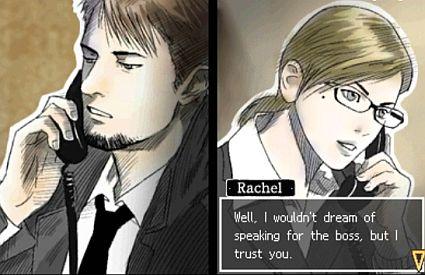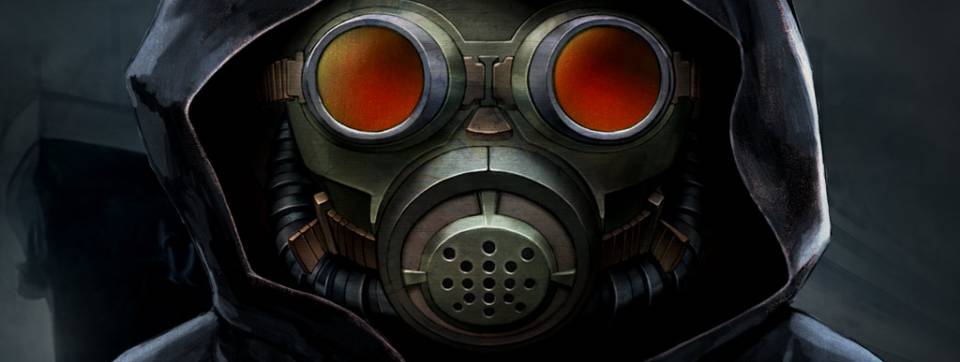Get Thee To A Nonary: Another 999 Blog
By Mento 13 Comments
A hearty welcome, the nine people who read these things, to a special blog about Nine Hours, Nine Persons, Nine Doors. I feel like this game's been talked about to death over the past few months, due in part to the site's coverage of the game via its most divisive medium, colloquially known around these parts as Scoopsmeister K (nobody calls him that).
Instead of writing a big ol' review or something equally constructive, I'm just going to put forth a few random observations about the game to encourage anyone still on the fence to try it out for themselves. As such, all spoilers have been concealed and the blog is safe enough to read for any 999 neophytes, though I would suggest steering clear of the comments just in case. It's not like I'll be moderating them or anything. What am I, some sort of moderating guy? Whatever they're called. Regulators, I think.
How many observations? I dunno, how about nine? Seems apropos.
1. Visual Novels
I wrote a little while back about how adventure games followed a similar evolutionary path in Japan as did RPGs: Both Japanese and Western variants had a mutual origin point in the form of an old PC mainstay - in the RPG genre's case this was with primitive turn-based dungeon-crawlers like Wizardry and Temple of Apshai, but with adventure games it was the classic text adventure format with its various parsers and "I don't understand 'go fuck yourself, wizard'" prompts. This genre evolved in the West to become graphically focused point-and-click adventures while Japan retained the text-heavy narratives that every so often called upon the player to solve a puzzle or two.
Truthfully, I have very little experience with visual novels, besides hearing about their meteoric rise during the Famicom era (thanks, as always, to Doc Sparkle's edifying Chrontendo series) and a few outliers fortunate enough to be localized here like the Ace Attorney series and Hotel Dusk: Room 215. Indeed, the DS seems to be the source for an influx of games with this visual novel format uncommon in the West, in much the same way the PSP has been for PS1/PS2 era JRPGs that XSEED and Atlus are going out of their way to find a niche audience that lack this discouragingly abundant apathetic attitude towards Japanese game design. (Though I often feel it's as much their fault as ours for failing to evolve and innovate with the times to a satisfactory degree, but that's a blog for another time.)
I've tried to make a greater push into adventure games in general this year, because it's been a genre close to my heart ever since I played the early SCUMM and Sierra games on my Atari ST as a pre-pubescent who got only half the dirty jokes those games tended to include, and I've had more fun with the lengthy and well-written stories of these visual novels - Hotel Dusk, Phoenix Wright, 999, Another Code, Katawa Shoujo (just kidding about that last one, sorry VGK) - than I have with traditional point-and-click adventures and the many idiosyncrasies inherent to that format. I couldn't say for certain if that's because, as an adult, I have less tolerance for inscrutable inventory puzzles or I've become better acclimated towards reading a lot of text on a screen. It's probably both.

2. Advice for new players
Before I start talking about the game in earnest, I'll throw a few provisos and tips for those just starting out, or are afraid to given this game's intimidating reputation. The first is patience: Get used to the game's foibles and skipping through text, because the pay-off is worth it. Second is keeping in mind you're in this for its story, not fantastic genre-defying gameplay. You could make the point that you'd be better off reading a book if you just wanted a story, but this is one of those circumstances where the interactive elements elevate the narration to something not only impossible with a book, but is a completely unique form of storytelling you're unlikely to find elsewhere. There are books with better stories and better characters, but nothing like this game's delivery method for those elements.
Third is that you ought to consult a FAQ for the true ending path, but only after beating the game twice. I say twice because many of the paths in the game are binary decisions: Playing the game twice allows you to see most of the game's puzzle content, and a better understanding of what the game is leading up to. Don't be discouraged by the two abrupt and disturbing endings you're likely to receive either, since you need to suffer a few of them to make better sense of the game's true conclusion. Also, they're kind of fun in a brutal downer ending sort of way. There's a few guides on GameFAQs marked "non-spoiler walkthroughs" that'll only highlight the decisions you need to make, as well as a few flowchart images that serve a similar purpose: These spoil very little, so you can consult them without ruining anything. Believe me, the true ending is very difficult to decipher unless you've seen several playthroughs and are really paying attention, and each playthrough still takes several hours even if you're skipping entire swathes of the story.
3. Puzzles
I'd have to agree with the naysayers that the puzzle rooms of 999 are its worst feature, for two chief reasons: The first is that they're all too easy and formulaic - it generally involves you checking all the drawers and containers for a series of items and then find the one special lock or device to which they all relate. It's quite extraordinary how many rooms fit this model, and it ultimately amounts to having puzzles that wouldn't challenge a Layton aficionado, let alone the brainy Mensa types that the cast all inexplicably appear to be (more on that in a moment). I found it a little extraordinary that folk had to cheat on a few of them.
(Especially a very simple Sudoku puzzle, which gives you half the numbers already. To digress a moment, the reason Sudokus became so popular is that they have a very broad difficulty curve. You see a tough one and might get completely lost, but then you try an easier one and you eventually pick up the basic rhythm in figuring them out: You then witness a continued marked improvement, managing to solve harder Sudokus faster, and this is instrumental to their addictiveness. The one instance in 999, though it doesn't explain much besides "every line and box needs the digits 1-9 and you can't have duplicates", is actually an entry-level version of the puzzle just in case you aren't familiar with the format.)
The second reason is that every puzzle needs to be solved each time, and cannot be skipped like the story parts you've already seen. It's a little aggravating, since you're getting very little out of solving a puzzle to which you already know the solution. You could make the case that these puzzles fly by on the second (or third, or fourth...) attempt and are of minor concern, but that just seems like an excuse for poor game design. But here's the crazy thing:
4. Annoying repetition is actually eventually justified by the true ending
So... stick with it. Don't worry about doing the same rooms again, because the puzzles just kind of whiz past due to their simple, capsular nature. There is a narrative reason why you're doing them over, despite there being little immediately obvious change in the narrative, and it is nuts.

5. The characters
The best part about 999 are the characters. Though perhaps goes without saying for a game that focuses on a strong narrative, since you can't have one of those without an intriguing dramatis personae. Of the nine main characters, absolutely nothing about them is certain. That's not an epiphany gained from watching the end-game and knowing what will happen; it's implicitly stated when the introductions are made. The enigmatic nature of those you're trapped with is quickly emphasized by them all immediately adopting pseudonyms that give nothing away, beyond the number that represents them (a key element to the game's SAW-esque Nonary Game conceit).
So while you're slowly learning about them, their personalities, whatever backstory they feel like telling the protagonist, how they deal with crises and the way they acquit themselves when the chips are down, there's always a sense for at least one of them that it's all an act: That one (or more) of these people is actually the villain, the mastermind, the killer. They all, to a person, have secrets they aren't divulging, and they all relate to why exactly they were chosen to participate in the Nonary Game (again, this is easily construed from context alone, not something I've only gleaned from beating the game) and it's fascinating stuff. Especially as the game-within-the-game will constantly require that the nine characters split into smaller groups. If you're a fan of one of those locked mansion whodunnits with a cast of suspicious characters, 999 adroitly utilizes that familiar construct as its launching point, before taking it in some bizarre directions.
6. The game's intelligence
What marveled me the most for a game made this century, and what I secretly suspect is the reason why this game is beloved by so many, is that it never talks down to the player. The characters talk about some really weird, heady stuff - morphogenetic fields, molecular biology, programming lingo, psychological behavioral studies, historical information about the Titanic (what would appear to be the setting for the game) and its sister ships - all of which regularly occur as asides between the protagonist and one of the other characters during the room puzzles. They often seem irrelevant, until you get different information on the same subjects in alternate playthroughs, and then you eventually discover what exactly is linking them all together. But that's neither here nor there; the important thing is that the game never assumes you cannot follow what's being said.
Furthermore, this intellectual streak extends to logical leaps too: Characters will immediately seize on the whys and hows of a circumstance either as soon as or even before they occur to you. The various times when you're tasked to solve a digital root (the game explains these, but it involves adding digits together to get a single digit number), the protagonist or another character has usually already done the calculations. Characters seem to know what various chemical formulae mean, or how baccarat is played, or any kind of esoteric acquired knowledge one might need to solve a puzzle room. It can get a little inexplicable how autodidactic a highschooler or a belly dancer might be, especially when they're depending on the player to solve some relatively rudimentary puzzles on their behalf, but as a general pattern I kind of appreciate a game that assumes I'm intelligent enough to figure out what's going on.

7. True Ending
Just gonna spoiler tag this one:
8. Virtue's Last Reward
After 999 I'm now super curious about its follow-up, given how it's supposed to build on the story and wrap up several of its loose threads. I've also heard promising things about it improved everything that didn't work so well in 999, specifically the puzzles. I'm definitely going to have to track down a copy of it at some point, possibly after a Last Window playthrough (from a series I'd recommend almost as highly as this one).
Though, as I believe Patrick and others have stated, it doesn't seem advisable to jump into VLR without playing 999 first. I'm glad I did, but since VLR is available in Europe and 999 apparently isn't, I'd either recommend folk in my neck of the woods to import the latter or wait for an iOS version. I, and others, might also want to check out that Ever17 game from the same writer (and part of a longer series called Infinity, the rest of which is Japanese-only if I understand it right). It's a PC game, but I have no idea how to acquire it legally, cheaply and Englishy at this point. Maybe some bright spark who represents the localized version's publishers can stick it on Steam with a "from the writer of 999/Virtue's Last Reward" endorsement? That oughta shift a few virtual copies.

9. Thanks
First and foremost, I want to thank user @teflonbilly. The guy imported 999 but found himself with an additional copy, after Amazon screwed up the delivery and let him keep it by way of apology. Since Giant Bomb had been making waves about the game at the time, he offered the surplus one to me, possibly knowing I'd find a way to drone on about it for several thousand words. I've been blessed with a lot of magnanimous gestures from this community over the past few years (though I technically knew Tef and gold membership sponsor omghisam prior to joining GB) and it's always unexpected and greatly appreciated.
While I'm here shamelessly circlejerking, I'd also like to thank this community and @patrickklepek - or "P-Klepz" - in particular for making this game so visible in recent months. I'd heard of it around the time it had came out, but having little experience with visual novels and discovering it had no European release kind of soured me on it, and then I kind of forgot about it as I do with most release news. That I've read and heard so much of the game of late made me intensely curious to try it, and I was fortunate to finally have an opportunity to play it that didn't involve breaking my parsimonious streak. So thanks to all who have written and recorded your thoughts on this brilliant and bizarre little gem.
Hey Klepek, in the off-chance you're skimming through this thing, pick up a copy of NieR. Consider it my way of returning the favor.
